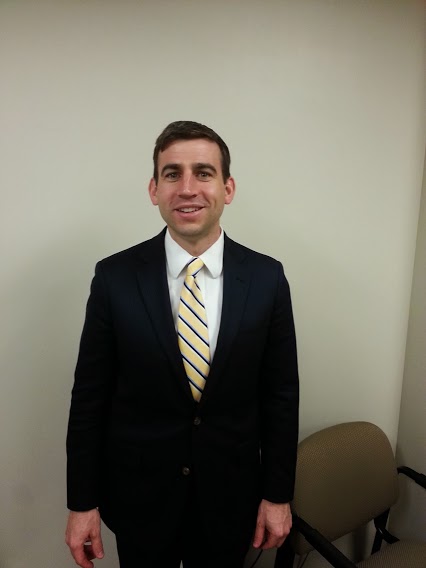AEI visits King's, links economic struggles to familial struggles
Financial District, NEW YORK--Josh Good of The American Enterprise Institute (AEI) visited King’s earlier this week to discuss the economic implications of the changing family structure. The lunchtime lecture, held in the City Room Oct. 28, focused specifically on “the crumbling architecture of the American family.”
AEI holds the view that in order to understand the plight of the American economy, one must first understand the American family.
Over the past couple of decades, America has seen an increase in divorce and out of wedlock births. Single parenthood has reached a point unprecedented in American history. Why?
Good explained that changes in the economic system, more women entering the workforce and a decrease in traditionally male industries have contributed to these issues. But those factors only explain so much.
What are the more pressing reasons? From a socio-cultural perspective, young couples are no longer encouraged to marry, religious participation has declined rapidly in only a few decades, “extended adolescence” (adult kids remaining financially dependent on their parents) has become a more acceptable lifestyle and technology and porn have replaced a desire for genuine human intimacy.
Good shared that individuals from broken families face a greater risk of poverty. Families, he explained, produce “human capital,” which consists of knowledge, physical traits and social skills, among others. The stock of human capital is worth close to $738 trillion, compared to $45 trillion of physical capital owned by American households.
Liberal and Conservative views concerning the source and the solution to this problem of economic and social decline only reach part of the root issue. While liberals tend to explain the decline of the American family as the result of flawed institutions (academic, social, financial), conservatives point to the moral and cultural problems that emerge from a society that has strayed away from traditional values.
Only the Christian view, Good argued, offers a comprehensive explanation for the problem.
“We don’t flourish in isolation,” he said.
Americans see this concept played out in the lives of individuals and families who depend on food stamps and/or unemployment benefits; it also explains the phenomena of single parenthood. Each of these examples reflects the absence of community and individual participation.
Good pointed out that this idea of community as an essential economic component can be traced back to Adam Smith’s The Wealth of Nations, in which Smith describes Capitalism as a combination of trust and collaboration. Smith himself claimed that Christianity is essential to Capitalism. In order to flourish, Good said that Americans must first “learn that helplessness hurts.”
“The free enterprise system exists for people,” Good said, because it allows individuals to pursue their God-given callings. Society's beliefs about good economic choices can cause stress and prevent people from specializing in what they do well, and what in turn will bring them the greatest joy.
AEI believes that if we as Americans hope to effect true change, we must be “actors as well as advisers.” The think tank sends representatives like Good across the country to recruit students who will commit to its cause to promote and perpetuate human flourishing. AEI hopes to partner with King’s students in its mission to raise up young leaders.
If this mission sounds like something you would like to get involved with, or if you would like to learn more, visit AEI’s website.


